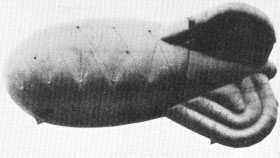 Click
for Site Directory
Click
for Site Directory
Pucklechurch, Bristol No.11 Balloon Centre.
11 Balloon Centre was formed at Bristol on 16th January 1939 then moved to Pucklechurch ,9h August 1939 and disbanded 22nd April 1945.
The five Squadrons that comprised this Balloon Centre underwent no changes in the location and equipment following the review
of defences brought in by the Battle of Britain.
Pucklechurch is some 7 miles from Bristol city and some 9 miles from the city of Bath.
During WWII it was home to No.11 Balloon Centre, a barrage balloon Depot, servicing 912, 927, 935, 951 and 957 Squadron. It helped to protect
Filton aircraft factory and of course Bristol Docks as well as being a threat to Nazi aircraft trying to bomb Gloucester. In the late 1940's it was the
headquarters of No. 22 Reserve Centre, R.A.F.
In March 1939 it was reported: "Meanwhile, building work for the home of the Balloon Barrage Squadron at Pucklechurch proceeds apace. Much of
it should be ready for occupation in a very few months time. Recruiting is going along very steadily for the squadrons, at an average of five a day,
which is quite good going. There should be a big fillip in this department as the result of a Gaumont- British film, Man the Barrage,” which is to be
shown at the Regent Cinema in the week beginning March 20 and at the New Palace in the following week. The Air Ministry is sending down
a demonstration crew with a balloon, and prospective recruits will thus have a firsthand view of what is a very enjoyable and most important
piece of work."
In June 1939 it was reported that:" The principal event in the Balloon Barrage Squadron’s calendar is now the prospect of moving into the new
headquarters at Pucklechurch some time next week. There are now 11 instructors attached to these units. The total of men now stands at 430,
with newcomers rolling along steadily."
In July 1939 it was reported that: "The Pucklechurch Balloon Centre is going ahead well and is already occupied by regular personnel. Training has
already been started for the auxiliaries another 400 are needed and recruits should apply to the Victoria Street Headquarters. The lower age limit
has been raised to 30. It is highly probable that the Victoria Street Headquarters will be exchanged for something much larger."
In July 1939 a newspaper reported : "CAMP ACCIDENT Falling over a plank at the Balloon Barrage camp at Pucklechurch, Raymond Milson (17), of
Pucklechurch, cut his head. He was taken the St.John Ambulance Hospital for treatment. "
In August 1939 the "Orders for National Service" were published in the local papers and Pucklechurch Balloon Centre was featured:
that order until further notice: August 27 —No. 927 Squadron September 3—No. 928 Squadron. September 16—No. 929 Squadron. (Signed* J.
LEACROPT, Group Capt.. Commanding."
At the same time an news report was put in the papers :
"R.A.F. FOOTBALL CLUB AT PUCKLECHURCH: An association football club has been formed at the Headquarters', No 11 Balloon Centre. R.A.F.,
Station., Pucklechurch., Gloucestershire. The club, which is applying for admission to the Bristol League, would like to arrange practice matches
with small clubs for any evening, and on Wednesday and Thursday afternoons. The Hon. secretary of the club is Mr V. N. Lee."
10000675 Aircraftman First Class Mark Leonard Patterson of 951 Squadron, Balloon Command Unit, RAF Pucklechurch, Gloucester was
recommended for a award for civil defence gallantry, the B.E.M.
The particulars of the action were that "on the night of 16/17th March 1941 he was on a evening pass and was near the Easton Road 'Bus Depot. At
about 21.00 hours the 'Bus Depot was set on fire and then burned. Being a 'bus driver in Durham in Civil Life, he volunteered to drive buses away
for dispersal. He was successful in starting up and driving away eight buses and after a rest, a further six. During this time many bombs were
dropped in the vicinity and on one occasion one fell just behind the 'bus he was driving. He showed complete disregard for his own personal
safety."
He was born 18th April 1915 and in 1938 was a motor driver and lived at 1 Hunwick Hunwick Lane , Crook and Willington U.D., Durham, England .
1159696 Aircraftman First Class Reginald Victor Hubbard 951 Squadron, Balloon Command Unit, RAF Pucklechurch, Gloucester was also
recommended for a award for civil defence gallantry, the B.E.M.
The particulars of the action were that "on the night of 16/17th March 1941, 1156969, A.C.1, Hubbard, R. V., who was a member of the crew at
site located in the Bristol Tramways & Carriage Co. Ltd. Bus Depot, and which was set on fire and hit with enemy bombs, volunteered and was
successful in dispersing a number of undamaged buses.
Throughout this period bombs were falling but A.C. Hubbard showed complete disregard for his personal safety".
As far as I can tell none of these men were actually awarded the B.E.M ., just another case of individuals who put their life on the line during the
war to save and rescue people and materials because it was what people did under these circumstances. They cared about the impact Nazi
damage would have on their country and sought to minimise it.
In January 1944 a newspaper informed the public: "Staple Hill to Pucklechurch 'Bus Stop signs are being erected on the Staple Hill—Pucklechurch
route. Hitherto buses on this route have stopped anywhere to pick up or set down. In future buses will only stop at Staple Hill, the bottom of
Oxhouse Hill; Mangotsfield Church; Pomphrey's Farm; Shortwood Park field Path; Syston Lane: Balloon Barrage Depot (officers' mess entrance);
Balloon Barrage Depot (main gates); Pucklechurch."
Clearly the traffic to and from the camp was significant enough to cause bus stop signs to be needed.
In January 1945 a degree of scandal fell on the Balloon Depot when a case of bigamy was publicised. A sentence of nine months imprisonment was
passed by Mr Justice Hilbery. at Gloucester Assizes yesterday, on a corporal in the R.A.F., William Frederick Hardwicke (39), who pleaded guilty to
marrying Beatrice Florence Best, a member of the W.A.A.F. Pucklechurch, near Bristol, on April 10. 1944. Another news report gave some
surprising insight into the case. "A member of the W.A.A.F. was led crying from Gloucestershire Assizes on Friday as Corporal William Frederick
Hardwicke, of the R.A.F., was sentenced to nine months' imprisonment for bigamously marrying her. Mr, Justice Hilbery described the case as
piece of quite inexcusable blackguardism, and a cowardly crime. Because his married life was unhappy was no excuse for deceiving the young
woman into believing that he was single. Mr. F. Lyne, for the prosecution, said Hardwicke met Beatrice Florence Best, who was in the W.A.A.F.,
quite casually in a canteen, and when he expected to be drafted he proposed to her, and they were married " at Pucklechurch on April 10,
last year. When Miss Best found out that he was already married he went to the Staple Hill Police and confessed. Mr. J. H. Moss, who defended,
said Hardwicke "married" Miss Best on the impulse, but she was willing to marry him properly if ever he was divorced."!!
In March 1946 a newspaper was asking:" The Ministry of Supply have no information whether or not hundreds of vehicles, mainly lorries and vans,
parked at a dump at Whitchurch are to be auctioned in connection with the national scheme. No information is available either about large dump
of Ministry Aircraft Production vehicles at Pucklechurch. Many the lorries are in a serviceable condition, but are rapidly deteriorating. The trade
would welcome the sale of these vehicles. Every one of them contains valuable spare parts, a dealer said yesterday."
After the war this became a non-flying Royal Air Force station called RAF Pucklechurch until 1959.
In 1962, HM Prison Service took the site over and built the Pucklechurch Remand Centre in 1965 with additional buildings added in 1978. The
inmates had a riot and destroyed the building in 1990. In 1999 the site became Ashfield Young Offender Institution it was closed for young
offenders in 2013 and become a closed adult prison dealing with sex offenders.
Here are some pictures of the Pucklechurch Balloon Sheds in 2011 sent in by the son of one of the men featured on this website and pictures we
took in 2018. Let us hope these sheds are preserved for many years to come. This was No.11 Balloon Centre at Pucklechurch, 1939 to 1945, and
RAF Station Pucklechurch, 1945 to 1959. Whether you like the new appearance or not it is good to see this listed building being preserved in its
general style and getting readied for a new purpose. It could have been raised to the ground by an unsympathetic developer.
When it is opened as a business we can only hope there is a ceremony of some sort to commemorate the work of Balloon Command during WWII.
A video of Pucklechurch Balloon Depot June 2018
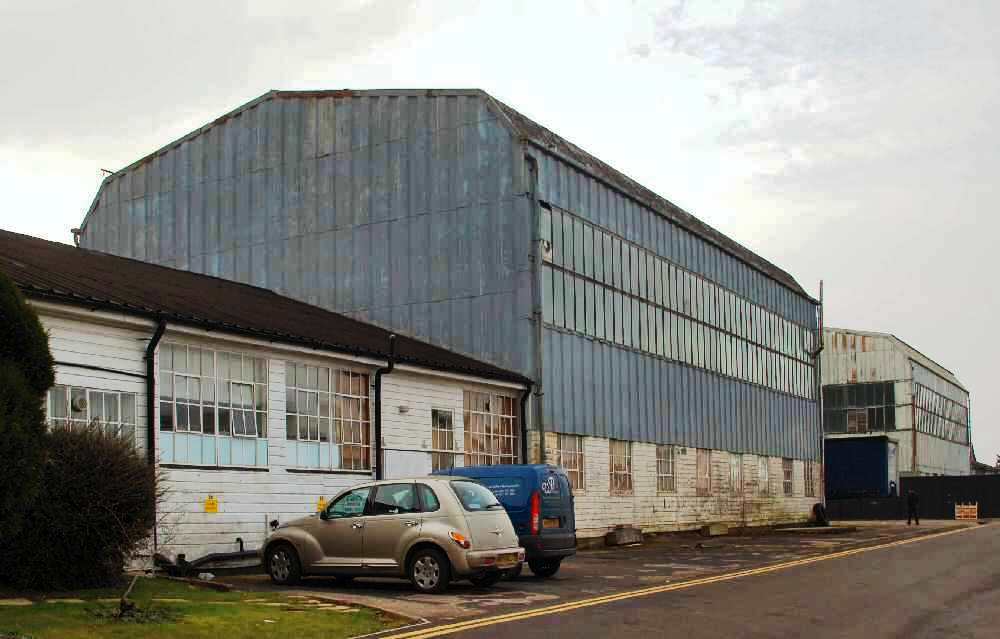
Here you can see the original ground floor windows of the building have been covered over and "painted in" to show their original
positions. A new door has been let in on the side of each building to make the building more efficient.
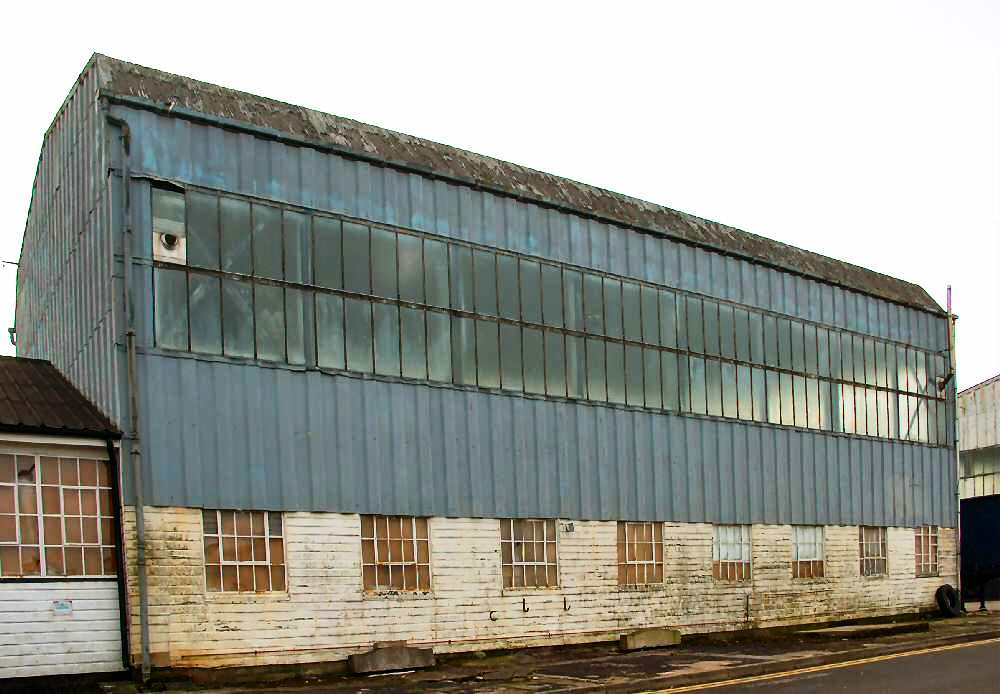
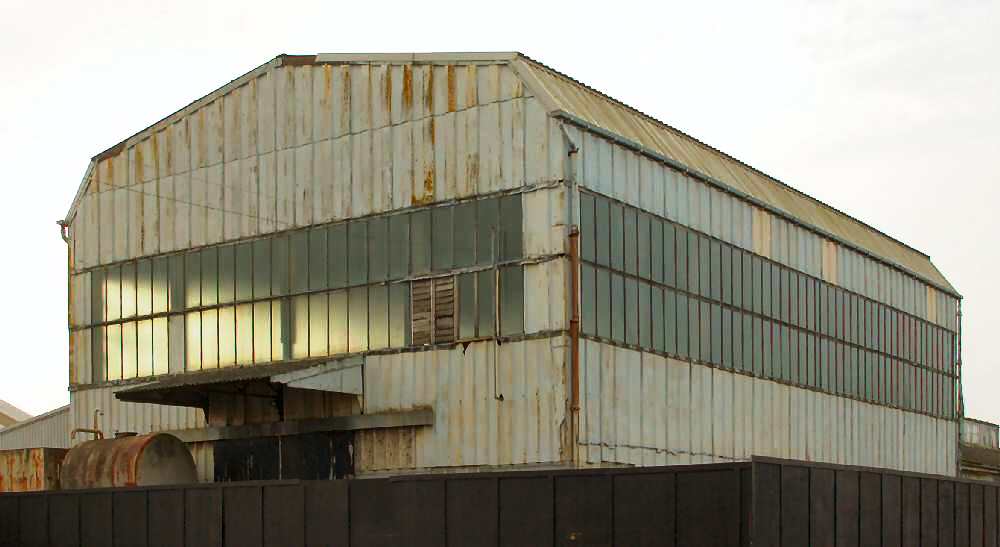
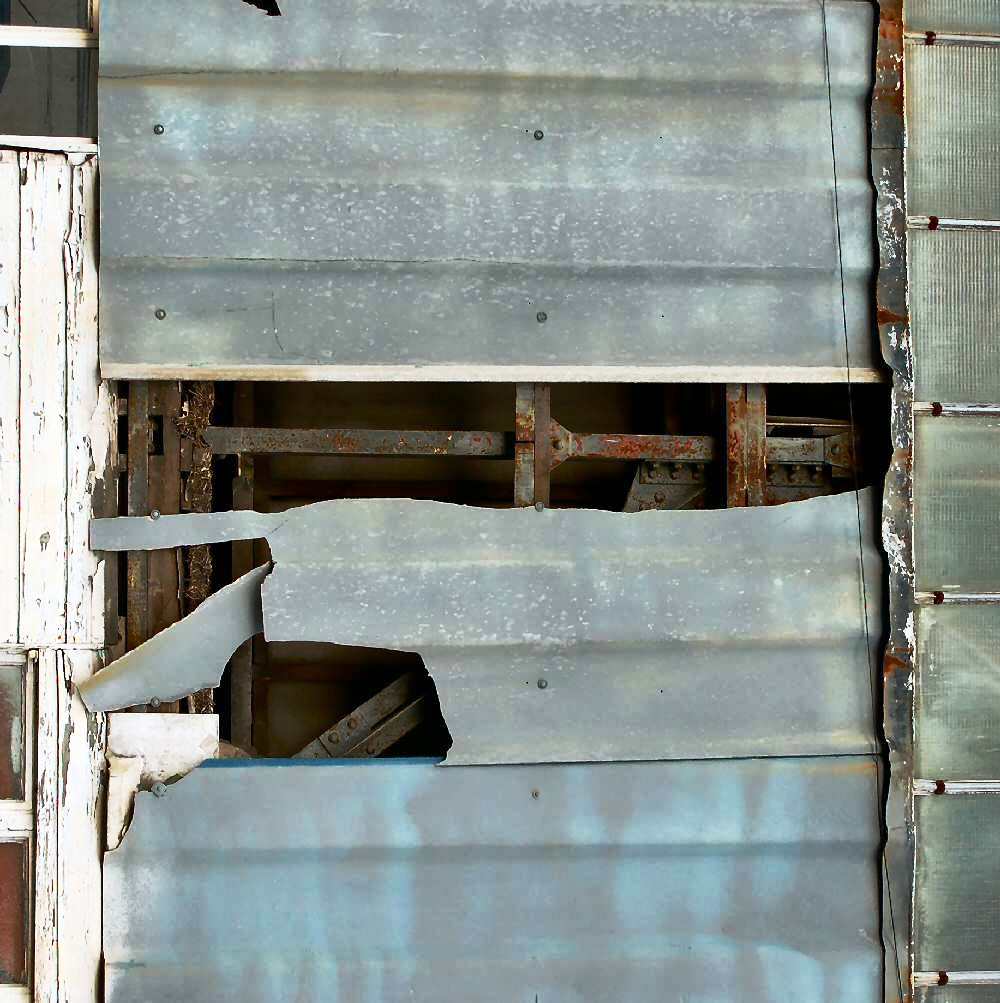
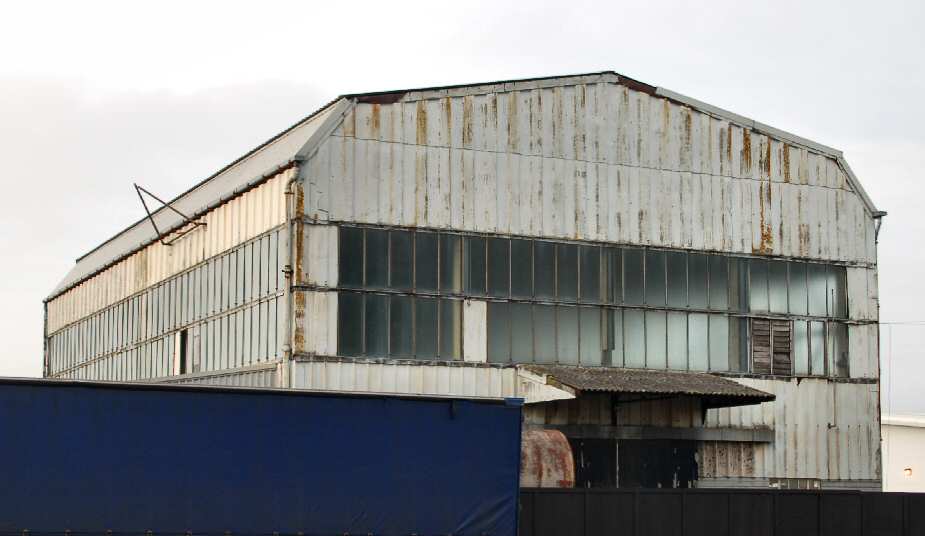
In addition to these unique sheds there is a mooring preserved at Pucklechurch.
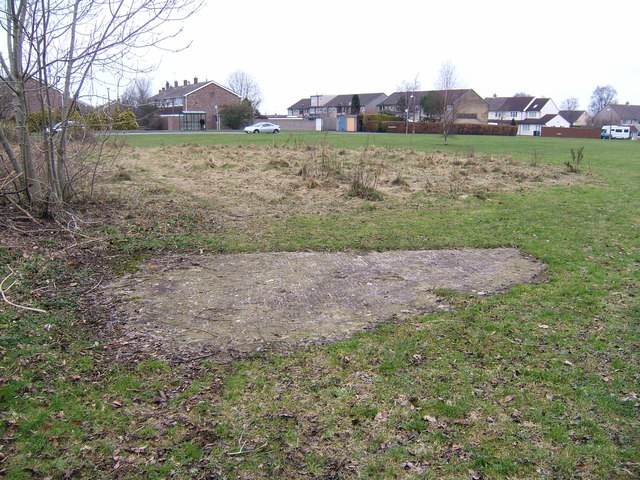
The balloon mooring site at Pucklechurch in 2011
© Copyright Ruth Riddle and licensed for reuse under this Creative Commons Licence.
Barrage Balloon Mooring Site and bed, east of 57 Oak Tree Avenue , on the green area opposite Patridge Road and Goldfinch Way. It
consists of a series of concrete blocks with iron rings in the upper surface and constitutes the central anchorage along with a series of
smaller concrete blocks for the guy ropes to be tied to when bedded down In 2018 the site was very overgrown.